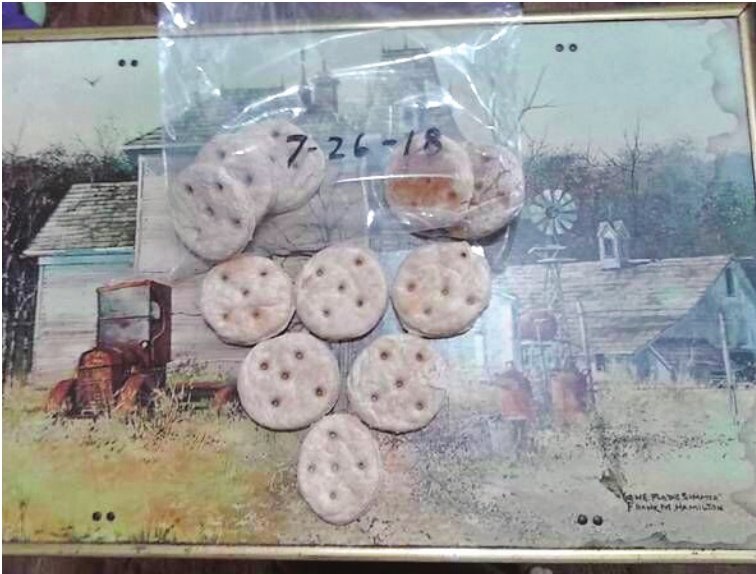
Hardtack biscuits have been a staple of military rations throughout history, serving time in European trenches and ancient Roman formations. Lansing artist Jet Rosas sees these long lasting biscuits, which tout a shelf life of 50-plus years, as a useful currency in end times disaster scenarios.
“When 2012 came around, I looked at people prepping — a lot of people were doing silver coins and gold bars,” Rosas said. “I thought to myself, ‘How do you trade a silver coin for food and water?
Why not instead of storing coins and silver, store barterbites and water?” Getting in on barterbites is easy, he said. “It’s just water, salt and flour. You can get the basic recipe anywhere on the internet. The only thing I’ve done is made it into something people can use as a currency.”
This currency might not be the most appetizing, but it will take care of the basics, Rosas said. “It’s like a salty mushy pretzel. You have to soak them in water for 10 minutes before you can eat them.”
This concept would have relevancy in the corners of the world that are struggling, said Rosas, who also claims the U.S. is not exempt from this possibility.
“With the situation now in Venezuela, Syria and Yemen — people would kill for these barterbites,” Rosas said.
According to Rosas, the dangers of longterm power outages would make barterbites come in handy. “I used to work in retail as a sales manager at AutoZone for 14 years. Whenever the electricity went out, guess what — it was hard to sell stuff and buy stuff,” said Rosas.
“Look at Puerto Rico right now. In Puerto Rico electricity is only on for a few hours a day. I’m not saying this is going to happen, but what I’m saying is — why not be prepared?” Rosas said he sets the value of barterbites at $3 per pound, or 30 cents per biscuit. “I had to come up with a number, because it is new and nobody is doing it. I figured the cost of a pound of flour and cooking it.”
Storing 40 pounds of barterbites in his closet, Rosas said that there are roughly 10 barterbites to a pound. He has at least 400 barterbites in his reserves, which, according to his set value, makes his collection worth $120.
“I want to make a standard size, so it will be easy for people to make,” he said. “I decided to use the top of a Mason jar. You take out the middle, press it down, put five holes in it and you’re done. Plus it is like a coin and people will be more into that.”
Aside from their usefulness as a currency in survival situations, making barterbites is much cheaper than buying hardtack from a retailer, he said. “You can buy nine ounces of hardtack for $9 in a sealed tin. It’s really expensive, and I thought that poor people can’t afford that. You make your own for pennies on the pound.”
Making and selling barterbites is possible under Michigan law. “I checked the law, and in Michigan you can sell homemade baked products.” According to the Michigan Department of Agriculture and Development, “Under the Cottage Food Law, nonpotentially hazardous foods that do not require time and/or temperature control for safety can be produced in a home kitchen (the kitchen of the person’s primary domestic residence) for direct sale to customers at farmers markets, farm markets, roadside stands or other direct markets.”
Today’s society places an overreliance on grocery stores, Rosas said.
“The food you buy from the grocery store is produced at least 50 to 100 miles away. Even when I was a kid in the early ‘60s or late ‘50s, I remembered going out in the yard and picking tomatoes and cucumbers, because our family had a garden. Every family should have a garden.”
Barterbites aren’t the first edible currency. The etymology of the word salary shows that it comes from salarium, a Roman ration of salt. Records from the Codex Mendoza, the Aztec historical record, show that cocoa beans were used by the Aztecs as currency — 100 cocoa beans bought a turkey and one bought an avocado.
“Food and clean water will be the currency of our future,” Rosas said. “I’m not saying that people will eat barterbites right now, but when there is nothing else to eat, they’ll eat them.”
Support City Pulse - Donate Today!
Comments
No comments on this item Please log in to comment by clicking here